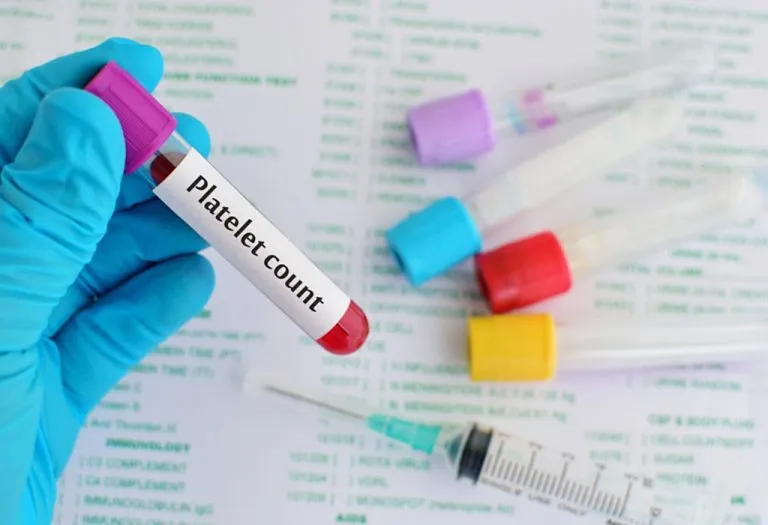Thrombocytopenia (Low Platelets) During Pregnancy – Causes, Symptoms & Treatment

A pregnant woman may face various medical challenges during her pregnancy, and one such challenge is a low platelet count, also known as Thrombocytopenia. Thrombocytopenia in pregnancy can occur due to multiple factors. Pregnant women go through many physical and emotional changes during pregnancy, and these severe pathological changes in the body may result in conditions such as thrombocytopenia. If left untreated, it can lead to complications like excessive bleeding during delivery, posing risks to both the mother and the baby. Regular monitoring of platelet levels, proper diagnosis, and timely medical intervention are crucial to managing thrombocytopenia in pregnancy effectively. Maintaining a balanced diet and following medical advice can also help mitigate the risks associated with this condition.
What Is Thrombocytopenia?
Platelets are responsible for blood clotting and play a significant role during pregnancy as well. The average or normal platelet count of a non-pregnant woman may range between 150,000 and 400,000 per microlitre of blood. The platelet count of a woman may drop to 116,000 per microlitre of blood during pregnancy. However, if it is less than 116,000, the condition is known as thrombocytopenia (1).
If there is only a slight drop in your platelet count, it is not a matter of great concern as it may not cause any medical complication for you or your baby. However, your platelet count will be monitored closely by your doctor or midwife to see if there is a further drop. However, extreme drop in your platelet count may cause serious problems and therefore, will require immediate medical help.
How Common is Thrombocytopenia During Pregnancy?
Thrombocytopenia or low platelet count during pregnancy is the second most common blood disorder after anaemia. It is observed that nearly 6 to 15% percent women may get diagnosed with a low platelet count during their pregnancy (2). Not all cases of thrombocytopenia may cause serious complication in pregnancy or childbirth, but it is better to prepare yourself to face any complications that may arise with this condition.
What Causes Low Platelet Count During Pregnancy?
Following are some of the causes of low platelet count in pregnancy (3):
- High Blood Pressure or Preeclampsia: When your blood pressure reaches alarming levels in pregnancy, it puts you and your child at risk. The risk involves damage to the organs of both mother and her unborn child. This condition may also cause low platelet count in a pregnant woman.
- Heparin-Induced Thrombocytopenia: Heparin is a medicine used to treat abnormal blood clotting. Sometimes the use of this medicine may result in low platelet count and this kind of thrombocytopenia is called Heparin-induced thrombocytopenia.
- HELLP-Haemolysis of Red Blood Cells Elevated Liver Enzymes and Low Platelets: This medical condition results from high blood pressure which may cause severe damage to the liver. The damage to the liver leads to platelet to drop resulting in thrombocytopenia.
- ITP or Immune Thrombocytopenic Purpura: This is an immune-mediated disorder which leads to a decrease in the platelet count of the body (4). In a primary ITP, the exact cause of immune destruction cannot be established, whereas the reason for immune destruction in secondary ITP may be caused because of Hepatitis C or SLE.
- Medicine Induced: There are many medicines that may hamper the platelet production. Some common drugs that may be used in pregnancy, such as, ibuprofen, paracetamol etc can affect the platelet formation in the body, resulting in thrombocytopenia.
- Systemic Lupus Erythematosus (SLE): This is an autoimmune disorder in which the body attacks itself. Pregnancy may elevate the chances of SLE by forming antibodies that destroy various organs. It may target bone marrow, which is responsible for platelet formation. The affected bone marrow may cause low platelet count.
- Cancer: A pregnant woman may be affected with Myelodysplastic syndromes and lymphoproliferative syndromes. These are the common types of cancers that may affect a pregnant woman resulting in low platelet count.
- DIC Or Disseminated Intravascular Coagulation: This disease can be caused due to various pregnancy-related medical conditions. This condition may cause widespread clotting in the body. The clotting may result in low platelet count.
- Aplastic anaemia: This blood disorder in pregnancy may result in complete destruction of the red bone marrow resulting in low platelet count.
- HIV/AIDS: HIV is an immune disorder that may also affect a pregnant woman. This infection causes destruction in the bone marrow. When HIV causes destruction in the bone marrow, it results in low platelet count.
Symptoms of Low Platelet Count in Pregnancy
During pregnancy, some women may develop thrombocytopenia—a condition characterized by a low platelet count. While mild cases may not cause noticeable symptoms, a significant drop in platelets can lead to certain warning signs like the ones below that require medical attention (5).
- Unexplained bruises appearing even with minor bumps.
- Cuts or nosebleeds that take longer than usual to stop.
- Tiny red or purple spots on the skin, often on the legs.
- Especially while brushing or flossing.
- Unusual vaginal bleeding during pregnancy.
- Fatigue or weakness due to anemia if bleeding is persistent.
Risks of Low Platelet Count During Pregnancy
A low platelet count (thrombocytopenia) during pregnancy can increase certain risks for both mother and baby. While mild cases may not cause complications, severely low platelets require careful monitoring to prevent potential dangers or risks like (6):
- Excessive bleeding during or after delivery
- Higher risk of cesarean delivery
- Spinal epidural hematoma
- Postpartum hemorrhage
- Complications for the baby
Treatment for Pregnancy Low Platelet Count
The treatment for low platelet count in pregnancy depends on the underlying cause and severity of the condition. While mild cases may only require regular monitoring, more severe drops in platelet count need targeted medical intervention (7).
- Regular monitoring – Mild cases (like gestational thrombocytopenia) often only need close observation of platelet levels.
- Treating the underlying condition – If preeclampsia, HELLP syndrome, or autoimmune disorders (like SLE) are causing low platelets, managing these conditions becomes the priority.
- Medications – Corticosteroids or IV immunoglobulin (IVIG) may be used to boost platelet counts in immune-related cases (like ITP).
- Platelet transfusions – Recommended in severe cases, especially before delivery or if bleeding risks are high.
- Delivery planning – If platelet counts are critically low, doctors may recommend early delivery or a C-section to minimize bleeding complications.
Precautions for Thrombocytopenia While Pregnant
Thrombocytopenia during pregnancy requires special care to prevent complications. While mild cases may not need treatment, these precautions can help manage the condition safely (8).
- Inform your doctor about any history of low platelets or bleeding disorders
- Avoid medications that thin blood (like aspirin or ibuprofen) unless prescribed
- Skip contact sports and activities with high injury risk
- Use a soft toothbrush to prevent gum bleeding
- Watch for bleeding signs (nosebleeds, bruising) and report them immediately
- Attend all prenatal checkups for regular platelet monitoring
How to Increase Low Platelet Count Naturally?
You may increase your low platelet count by following natural methods (9):
- By including beetroot in your diet.
- By including fish and meat in your diet.
- By consuming astragalus (herb).
- By adding zinc supplements
- By consuming vitamin B-12, generally found in meat
- By consuming Vitamin K, generally found in green leafy vegetables
- By consuming chlorophyll
- By consuming Vitamin C rich food ( citrus fruits )
- By avoiding alcohol and refined sugar
Though consuming foods that may help increase your platelet count may seem like a good idea, but it is recommended to seek your doctor’s advice before making any dietary changes.
FAQs
1. What happens if you have thrombocytopenia before pregnancy?
If you have thrombocytopenia before pregnancy, it may be due to an existing condition or medication. Your doctor will monitor your platelet levels regularly, as there is no single test to diagnose the exact cause. In cases of gestational thrombocytopenia, treatment is usually unnecessary, but your doctor will keep track of your platelet count to ensure a safe pregnancy.
2. Is it safe to get dental work done during pregnancy with low platelets?
Procedures with bleeding risk (like extractions) should be postponed unless urgent. Always consult your hematologist and obstetrician first, and ensure platelet counts are checked beforehand.
3. Can gestational thrombocytopenia recur in future pregnancies?
Yes, women who develop gestational thrombocytopenia (mild, pregnancy-related low platelets) have a higher chance of recurrence in subsequent pregnancies, though it typically remains harmless.
If the low platelet count is established in the later stages of pregnancy, then it may due to various reasons such as preeclampsia or HELLP syndrome. You will be treated according to the symptoms of your condition.
This was all about low platelet count and pregnancy. Though most cases of thrombocytopenia do not pose a serious threat to you or your unborn child, however, if you have been diagnosed with this condition, it is important that you get the apt treatment for the same. Timely detection and treatment of your condition will reduce the chances of complications.
References/Resources:
3. National Library of Medicine – Thrombocytopenia in Pregnancy
4. National Library of Medicine: StatPearls – Thrombocytopenia in Pregnancy
5. American Cancer Society – Thrombocytopenia (Low Platelet Count)
6. Pregnancy, Birth & Baby – Low platelets during pregnancy
7. American Society of Hematology – How I treat thrombocytopenia in pregnancy
8. Mary Bird Perkins Cancer Center – Thrombocytopenic Precautions
9. UT Southwestern Medical Center – How can having low platelets affect my pregnancy and birth plan?
Also Read:
High BP during Pregnancy
Blood Clots during Pregnancy
Blood Clot in the Uterus During Pregnancy
Was This Article Helpful?
Parenting is a huge responsibility, for you as a caregiver, but also for us as a parenting content platform. We understand that and take our responsibility of creating credible content seriously. FirstCry Parenting articles are written and published only after extensive research using factually sound references to deliver quality content that is accurate, validated by experts, and completely reliable. To understand how we go about creating content that is credible, read our editorial policy here.




































